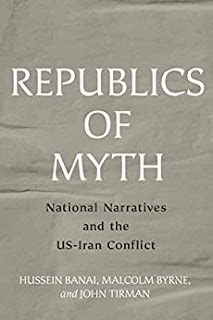In everyday diplomatic practice, national narratives are sometimes the hardest part to overcome. Rooted in mentalities and national representations, those stories do represent sometimes the chore of the identity itself. Once removed or readjusted, particularly if suddenly, may create dramatic identity rifts.
Republics of Myth. National Narratives and the US-Iran Conflict is a co-authored volume of analysis by Hussein Banai, Malcolm Byrne and John Tirman displaying and explaining the complex interactions - mostly behind the public eyes - between the two nations at war. A war of words, a war of decisions, a war of the narratives.
The authors are very informed, using local knowledge and national intelligence archives, which makes the information provided valuable and reliable. However, like in the case of the national narratives skillfully analyses, it´s always a matter of perspective and no matter how much information you may have on a topic, the choice of the topic itself is subjective. Definitely, Iran and US do have conflicting narratives, sometimes fuelled by other interests than the ones aiming at improving their own nations. On the other hand, neglecting the horrible human rights record and abusive character of the Iranian regime against their own people, which makes far more victims than the sanctions, may look dubious given the tremendous available information the authors had at their disposal.
There are aspects regarding international terrorism the regime in Tehran supports in the region, but without a throughout analyses that may reveal in fact why allowing them to own a nuclear bomb may be controversial. Minimising international critics agains the Nuclear Deal as being issued by the ´pro Israel lobby´ - I´ve lost count how many times this expression it was mentioned in the book - is distoring the value of the information provided and analyses.
Another rather controversial take is using geopolitical paradigms of ´border expansion´ which do have a highly controversial reputation, being used in various expansionists ideologies. Comparing the expansion of the US interests towards the Middle East with the previous expansion to the (wild) West, a a race for resources, largely uncritically, needed more than a paradigmatic translation in a completely different and much more complex context.
Republics of Myth is an important book for anyone interested in conflictual national narratives and their part in fuelling international conflict, but should be rather took with the very critical take, which is exactly how academics and intellectuals in general should consider any given facts, particularly of recent historical relevance.
Rating: 3 stars

No comments:
Post a Comment